The Cinematheque

January / February 2023
The Cinematheque, founded in 1972, is a film institute and media education centre devoted to celebrating the art and history of Canadian and international cinema and understanding the impact of moving images and screen-based media in our lives. Our public activities include a year- round calendar of curated film exhibitions devoted to important classic and contemporary films and filmmakers and an array of community outreach programs offering interactive learning opportunities in film appreciation, filmmaking, digital literacy, and critical thinking. We value cinema as a communal and transformative experience; believe in the importance of inclusivity and diversity in programming; and are committed to showcasing the finest achievements of local and national artists along with the best in world cinema.
Buying Tickets
The Cinematheque box office opens 30 minutes prior to the first screening of the day. Tickets can be purchased in advance online at thecinematheque.ca or during screening hours at our box office.
By purchasing a ticket to a screening at The Cinematheque, you automatically become a member of the Pacific Cinémathèque Pacifique Society.
Support
The Cinematheque is a not-for-profit society incorporated in the province of British Columbia and a registered Canadian charity. We rely on financial support from public and private sources. Donations are gratefully accepted. A tax receipt will be issued for all donations of $50 or more. support@thecinematheque.ca
Venue Rental
The Cinematheque theatre is available for rental. We offer simple, all - inclusive rental terms and top-quality service, and are equipped for the projection of a wide range of film, video, and digital formats. Whether you are looking for somewhere to host a private screening, film premiere, community event, conference, or work function, our theatre is the ideal venue. theatre@thecinematheque.ca
Advertising
The Cinematheque offers advertising opportunities in this program guide, on-screen in our theatre, and digitally in our weekly e-blast. advertise@thecinematheque.ca
Executive Director
Kate Ladyshewsky
Artistic Director
Shaun Inouye
Learning & Outreach Director Chelsea Birks
Communication & Marketing Manager Gerilee McBride
Venue Operations Manager Linton Murphy
Technical Manager & Head Projectionist Al Reid
Operations Coordinator Emma Pollard
Learning & Outreach Coordinators Thea Loo, Sam Mason
Programming Assistant Michael Scoular
Learning & Outreach Work Experience Student Ethan Florendo
Theatre Managers
Amanda Blake, Asher Penn, David Avelino, Salem Sharp
Relief Projectionists
Dama Correch, Ryan Ermacora, Lukas Henne, Abigail Markowitz, Nic McRobbie, Cassidy Penner, Jana Rankov
Board of Directors
David Legault (Chair) Nicole Prior (Vice Chair) Rudy Bootsma (Treasurer) Tim Reeve (Secretary) Erika Kumar Leah Mallen Eric Wyness
Theatre Volunteers
Chris Ayers, Hamish Ballantyne, Taylor Bishop, Kyle Bowman, Sasha Bondartchouk, Haley Briggs, Miranda Burgess, Cedric Chauve, Nadia Chiu, Robert Ferguson, Moana Fertig, Gail Franko, Ken Gordon, Shokei Green, Pablo Griff, Fiona Hu, Gerald Joe, Chris Kay, Savannah Kemp, Alan Kollins, Ray Lai, Stewart Lampe, Christina Larabie, Simon Lee, Kam Fung Li, Chelsea Lomax, Qun Ma, Jim Miller, Vit Mlcoch, Levi Muñoz, Syed Mustafa, Lars Neufeld, Veronika Ong, Morgan Reuber, Sweta Shrestha, Danika Speight, Lora Tanaka, Kate Tung, Jonathan Wells, Harry Wong
Special thanks to our spare volunteers! Library Betty- Lou Phillips Mailings Jo B.
The Cinematheque’s program guide is published six times a year with a bi - monthly circulation of 9,000–11,000.
Program notes: Shaun Inouye, Michael Scoular
Additional program notes by Jim Sinclair
Design & layout: Gerilee McBride
The Cinematheque gratefully acknowledges the financial support of the following agencies:
situated on
Classification Information Screenings are restricted to 18+ unless the film has been classified by Consumer Protection BC. This is indicated in our program guide and/or on our website by the inclusion of one of the following ratings:
Suitable for all ages
Parental discretion is advised Viewers under 14 years of age must be accompanied by an adult Viewers under 18 years of age must be accompanied by an adult
Ticket Rates $14 General (18+), $12 Senior (65+), $10 Student Multi-film Ticket Packs are available for purchase at a discounted rate from our Gift Shop. Ticket rates may vary for special events. Film Club, our family matinée series, has the reduced admission rate of $6 for ages 13 and under.
instagram @thecinematheque facebook.com/thecinematheque twitter @thecinematheque vimeo.com/thecinematheque
1131 Howe Street, Vancouver thecinematheque.ca 200 – 1131 Howe Street Vancouver, British Columbia V6Z 2L7 604 688 8202 info@thecinematheque.ca
Cover image: Guy Maddin, Surf toupée, collage Contents image: Bambi, David Hand, 1942
The Cinematheque is
the unceded, ancestral homelands of the xʷm əθ kʷəy̓ə m (Musqueam), S ḵ w x̱ wú7mesh (Squamish), and s ə lilwətaɬ (Tsleil-Waututh) Nations.
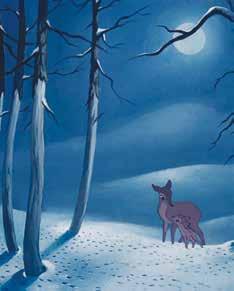
January / February 2023 2 The Infernal Affairs Trilogy 4 New Restorations 6 Michael Roemer × 3 8 The Image Before Us 12 Celluloid Dreamland: The Cinema of Guy Maddin 14 Calendar 18 Early Cinema 2-Day Filmmaking Workshop 23 New Cinema 24 Suwa Nubuhiro × 3 26 Chan Centre Connects 26 Cinema Thinks the World 27 DIM Cinema 28 Frames of Mind 29 Film Club Please note: The Cinematheque will be closing temporarily (March–April 2023) for a renovation of the theatre washrooms. The project will involve: the removal of a wall between the two pre-existing washroom areas; installation of an accessible, motorized washroom entrance door; and floor-to-ceiling partitions to create gender neutral facilities. Once complete, our washroom will allow for more personal privacy, accessibility, and inclusivity. Visit our website (thecinematheque.ca) for more information and timely updates.
The Infernal Affairs
January 5–12
January 5 (Thursday)
6:30 pm
January 6 (Friday) 6:30 pm
January 8 (Sunday) 3:30 pm
January 12 (Thursday) 8:45 pm
January 5 (Thursday) 8:40 pm
January 7 (Saturday) 6:00 pm
January 8 (Sunday) 6:00 pm
Infernal Affairs
無間道
Hong Kong 2002

Andrew Lau Wai-keung, Alan Mak 101 min. DCP
New Restoration
The Hong Kong crime drama got a slick millennium makeover and graduated to full-blown blockbuster with Infernal Affairs, the double-agent actioner that spawned a pair of sequels and a Scorsese remake. Starring two of the industry’s most bankable leads, Tony Leung Chiu-wai and Andy Lau, this pressure-cooker thriller boasts one hell of an irresistible hook. Leung Chiu-wai is a cop deep undercover as a triad member. Lau is a triad member who has infiltrated the upper brass of the HK police force. When a series of missteps tips off the existence of a mole in each organization, the operatives are tasked with sniffing out the sleeper (that is, themselves) while simultaneously trying to unmask the other. A masterclass in white-knuckle, parallel storytelling, Infernal Affairs also serves a potent allegory of identity crisis for a newly postcolonial Hong Kong.
Best Film, Director, Leading Actor, Supporting Actor, Sound Effects
Golden Horse Awards 2003
“The sensationally matched Lau and Leung, lupine and doe-eyed respectively, spark fireworks that make Heat ’s De Niro-Pacino summit look like an awkward blind date.”
Dennis Lim, Village Voice
Infernal Affairs II

無間道II
Hong Kong/Singapore/China 2003
Andrew Lau Wai-keung, Alan Mak 119 min. DCP
New Restoration
“Ingeniously anticipating the action of the original, while intricately involving in its own right, this should help restore your faith in prequels. It’s slick and atmospheric, knowingly directed and superbly played.”
Patrick Peters, Empire
Swiftly greenlit after the enormous success of the original, this sophisticated prequel to the Hong Kong policier expands the story by setting back the clock. Here, the dominoes that triggered the dizzying events of the first film are still being set up, with younger versions of the dueling moles (played by Edison Chen Koon-hei and Shawn Yue Man-lok) narrowly escaping detection as they climb the ranks of the triad underworld and police force respectively. Revelations about the shared histories of their superiors, meanwhile, complicate the narrative we think we know. Set during the disquieting countdown to Hong Kong’s 1997 handover, returning directors Andrew Lau Wai-keung and Alan Mak’s scintillating crime drama broadens the scope of the complex saga while amping up the politics only obliquely contained in the original. A third installment, shot back-to-back with II, rounds out the trilogy.
2
Trilogy
January 7 (Saturday) 8:30 pm
January 8 (Sunday) 8:30 pm
January 6 (Friday) 8:40 pm January 9 (Monday) 7:00 pm
Infernal Affairs III

無間道III
Hong Kong/China 2003
Andrew Lau Wai-keung, Alan Mak 118 min. DCP
New Restoration
Andrew Lau Wai-keung and Alan Mak’s gripping conclusion to their Infernal Affairs trilogy stages a gutsy structural gambit that cleaves the story’s timeline in two. Alternating between episodes set before and after the events of the original, this dual sequel-prequel finds superstars Tony Leung Chiu-wai and Andy Lau reprising their roles as enemy moles in the increasingly indistinguishable worlds of law enforcement and criminal enterprise. While one operative’s story pushes forward, the other’s starts over. (Those in the know can guess which and why.) Cantopop superstar Leon Lai joins the cast as a shady new inspector on the force. Released just two months after the second installment, this Rubik’s Cube finale to the cops-and-triads saga is far and away the most polarizing of the lot. Still, it’s exhilarating to watch the gang back together for some eleventh-hour intrigue and just deserts.
“Essential viewing for audiences hooked into the cycle … Eric Tsang as the shifty, mercurial Hon emerges as the trilogy’s major delight.”
Derek Elley, Variety
The Departed

USA 2006
Martin Scorsese 151 min. DCP
Swapping Hong Kong’s grimy underbelly for South Boston’s, this powder-keg American remake of 2002’s Infernal Affairs was a critical and commercial masterstroke for Martin Scorsese, who finally scored an Oscar (Best Director) for his efforts. Apart from its Stateside migration—and a director-compulsory injection of Catholic guilt into its thematics—the nuts and bolts of the film remain largely faithful to the original. Matt Damon plays a spy planted in the Massachusetts State Police by Irish mob boss Frank Costello (Jack Nicholson). Leonardo DiCaprio is an officer undercover in Costello’s crew. Scorsese ratchets up the tension (and violence) with characteristic virtuosity, as each imposter attempts to uncover the other before being found out themselves. Mark Wahlberg, Martin Sheen, Ray Winstone, Alec Baldwin, and Vera Farmiga round out the excellent cast. The Departed appeared on countless critics’ year-end best-of lists and won three Oscars in addition to Scorsese’s, including Best Picture.
3
“A relentlessly violent, breathtakingly assured piece of mean-streets filmmaking.”
Ty Burr, Boston Globe
New Restorations
Paul Schrader
January 12 (Thursday)
6:30 pm
January 15 (Sunday) 6:00 pm
January 20 (Friday) 8:30 pm
January 22 (Sunday) 6:00 pm
January 23 (Monday) 8:20 pm
January 14 (Saturday) 8:30 pm
January 16 (Monday) 6:30 pm
January 19 (Thursday) 9:00 pm
The Rules of the Game
(La règle du jeu)
France 1939 Jean Renoir 106 min. DCP

“The film of films” (François Truffaut). Jean Renoir’s supreme masterpiece—returned to full glory in this dazzling 4K restoration—is one of cinema’s essential works and inexhaustible pleasures, and is regularly cited as one of the greatest films ever made. A ferocious farce that captures French society on the brink (it was released on the eve of WWII), the film is set during a weekend house party at an opulent country château, where the complicated romantic intrigues of the high-society guests are mirrored in the parallel activities of the servants. The wonderful ensemble cast features Renoir himself. The superlative deepfocus cinematography is by Jean Bachelet. The Rules of the Game is social comedy at its most brilliant, offering a warm, generous, and humanistic portrait of a world where honesty and sincerity can be catastrophic—where “Everyone has his reasons,” in Renoir’s trademark phrase. Required viewing for anyone who loves cinema, or life.
“Arguably the culmination of early talking cinema—a tour-de-force of spontaneous artifice and an ensemble piece that’s never been bettered.”
No Fear, No Die (S’en
fout la mort)
France 1990 Claire Denis 90 min. DCP
“Elegant, spare, poetic, uncomfortably quiet, and, at times, inscrutable, No Fear, No Die is a little-known masterwork in the oeuvre of Denis.”
Gwendolyn Audrey Foster, Senses of Cinema
Claire Denis’s underseen follow-up to her exceptional debut Chocolat was among the few absentees in our major 2019 Denis retrospective. Let this dazzling new 2022 restoration serve as our belated corrective! Set on the nocturnal fringes of Paris, the film concerns two African immigrants (Isaach De Bankolé and Alex Descas) who eke a living out of staging illegal cockfights in a restaurant basement. Living in windowless squalor with the fowls they train, the pair start to snap when the restaurant’s seedy owner (Jean-Claude Brialy), who has history with one of their mothers, demands more bloodshed in the ring. Inspired by the anticolonial theories of philosopher Frantz Fanon, Denis’s sophomore feature is a potent allegory of colonial violence, rendered in her woozy, intimate, visceral style. It marked Denis’s first collaboration with Descas, from here on a mainstay of her cinema, and features a jazz score by Abdullah Ibrahim.

“One of the most heart-wrenching films ever made.”
4
Amy Taubin, Artforum
J. Hoberman, Village Voice
“If one movie can stand for all others, represent all that film can be, that film is The Rules of the Game.”
January 14 (Saturday) 6:30 pm
January 16 (Monday) 8:30 pm
January 20 (Friday) 6:30 pm
February 16 (Thursday) 8:20 pm
February 19 (Sunday) 6:00 pm
February 24 (Friday) 6:00 pm
February 26 (Sunday) 6:00 pm
O Sangue (Blood)
Portugal 1989 Pedro Costa 99 min. DCP
Before Pedro Costa dedicated himself to the worlds, real and imagined, contained in Fontainhas (the setting for five of his films, most recently the Locarno-awarded Vitalina Varela), he directed this winter noir, a transformation of Nicholas Ray’s Rebel Without a Cause. As in that James Dean, Natalie Wood, and Sal Mineostarring melodrama, Vincente (Pedro Hestnes), Clara (Inês de Medeiros), and Nino (Nuno Ferreira), each abandoned in their own way, form a fragile yet familial bond. Shadows threaten to engulf their lives, materializing as debts, threats, and in Martin Schäfer’s gorgeous black-and-white photography, but Costa also makes room for an occasional glimpse of bliss. As his contemporary Leos Carax trailed the French New Wave, so Costa, as he put it, “rides on the shoulders of giants,” following Portuguese Cinema Novo trailblazers like Paulo Rocha
“[Costa’s] admirers include the French director Jacques Rivette and the Canadian photographer Jeff Wall … [His] first feature, a black-and-white reverie is, in the best sense, a young man’s film, drunk on romantic doom and movie love.”

Millennium Mambo 千禧曼波
Taiwan/France 2001 Hou Hsiao-hsien 119 min. DCP
Taiwanese master Hou Hsiao-hsien, “the world’s greatest narrative filmmaker” (J. Hoberman, Village Voice), entered the aughts with this atmospheric tone-poem set and shot in Taipei. Gorgeously lensed by Hong’s longtime cinematographer Mark Lee Ping-bin (who contributed camerawork to Wong Kar-wai’s In the Mood for Love), the film is noticeably more intimate than Hou’s earlier efforts, favouring shallow-focus compositions and close-quarter settings to evoke the claustrophobic character of Taiwan’s capital city. This also brings visual candour to the story’s central thread: the stifling inability of a listless young woman (an entrancing Shu Qi) to escape her abusive boyfriend. Told as a techno-scored, neonlit memory from the year 2011, Millennium Mambo taps into the modern-day malaise of a generation longing for the future so that the present can become the past. An immersive and entrancing work from one of contemporary cinema’s preeminent artists.

5
Dennis Lim, New York Times
“Opens with a vision of the sublime … The visual pleasures are enormous and often deeply touching.”
Manohla Dargis, Los Angeles Times
“Every frame throbs with passion, artistry, and a profound understanding of charted and uncharted cinematic terrain.”
David Jenkins, Time Out
“A slow burn of profound sadness salved by some of Hou’s most breath-catchingly beautiful passages to date.”
Dennis Lim, Village Voice
Michael Roemer × 3
Let’s begin at the end: Michael Roemer’s fiction features are finally available in new restorations. They have played, to great acclaim, across North America, at New York and Harvard and Toronto, and even though his career follows no easily summarizable trajectory, he has a growing number of supporters who say he must be counted among the great American independents of the 20th century. This all might not have happened, however, if not for the cross-border escape of a child refugee.
Roemer was born in Berlin, into a Jewish family, on New Year’s Day 1928. At the dawn of WWII, the Kindertransport took him to the UK. When the war ended, he was reunited with his mother in Boston, and enrolled at nearby Harvard University (where annual tuition was $400). Everywhere, he writes, “I had been haunted by difference.” Now in America, he was the son of a divorced mother, a visible outsider, and a burgeoning devotee of cinema, yet one “not persuaded by most American movies at that time.”

Though his early writing as a film critic shows he favoured Kurosawa, Dreyer, and Bresson, his first professional work behind the camera came in non-fiction, making science and educational programs for TV (including Anne Slack’s influential Parlons français). Other directors of note have travelled similar paths (Abbas Kiarostami, Barbara Loden, Joan Micklin Silver), but Roemer’s paradoxical strengths mark him out as an irreducible original. Classically educated in ageless myth and irony, in practice he became a chronicler of diverse ways of contemporary life, featuring the Jim Crow south in Nothing But a Man, the Jewish enclaves of the Bronx in The Plot Against Harry, and gothic New England in Vengeance Is Mine
Roemer, whose first feature-length documentary was rejected by NBC for not shying away from a neorealist portrait of poverty, was well aware of the model provided by that Italian movement. But in order to do justice to these three milieus, all of them carefully researched for years before cameras rolled, what emerges in his cinema, not unlike Dreyer’s, is a quest for miracles. Marked by dialogue full of wisdom and wit, yet plotted according to all-too-human heroic impulses, Roemer’s films are the kind of cinema rare in any age: alive to the historical moments in which they were made, but built out of the elemental material that lasts.
6
January 13–23
Bilge Ebiri, Vulture
January 13 (Friday) 6:30 pm
January 15 (Sunday) 8:10 pm
January 21 (Saturday) 6:30 pm
January 13 (Friday) 8:30 pm
January 19 (Thursday) 6:30 pm
January 22 (Sunday) 8:15 pm
January 21 (Saturday) 8:30 pm
January 23 (Monday) 6:30 pm
Nothing But a Man
USA 1964
Michael Roemer 95 min. 35mm
35mm Print
Michael Roemer’s debut feature is a moving, Motown-scored portrait of a divided community. Confidently staking out its emotional and political range, Roemer plots the charts of two star-crossed lovers: Duff (Ivan Dixon), a railroad labourer, and Josie (Abbey Lincoln), a teacher and the daughter of a local (and well-connected) preacher. Their romantic repartee wouldn’t be out of place in the annals of noirinflected, sensitive Hollywood classics, but Roemer dials further out, to the compromises their segregated Alabama town demand of the young Black couple, and to Duff’s familial past. Roemer’s ability to isolate heartbreak and joy, holding them in a careful balance, was born of intimate collaboration and personal risk (the movie had to be filmed in New Jersey out of safety considerations). After its release, the film’s impact was enough that Malcolm X, passing Julius Harris, who plays Duff’s father, stopped in the street to congratulate the actor on his accomplishment.
“One of the great American independent films.”
 Amy Taubin, Artforum
Amy Taubin, Artforum
Vengeance Is Mine
USA 1984
Michael Roemer 118 min. DCP
New Restoration
“Fantastic, not to mention fantastical … This is a masterpiece of direction … everything true, right—for these characters, under these circumstances.”
Wesley Morris, New York Times
Brooke Adams starred in three unimpeachable masterpieces over the span of just six years: Terrence Malick’s Days of Heaven, Philip Kaufman’s Invasion of the Body Snatchers, and Michael Roemer’s Vengeance Is Mine. It’s possible to describe the beginning of Roemer’s film, as Adams’s character Jo stops off to tie up loose ends in New England before jetting off to the dawn of a new career in Seattle, in a way that sounds close to the alternately tough and sensitive character dramas of James L. Brooks (Broadcast News) or Bill Forsyth (Housekeeping). But this beguiling, transformative, and astonishing movie is a true shapeshifter. Roemer’s mastery of form reaches its peak here, absorbing the influences of Ingmar Bergman and Henry James in a tale of psychological doubling that never relinquishes its sense of haunting mystery, right up to its final, unforgettable image.

The Plot Against Harry
USA 1971
Michael Roemer 81 min. DCP
New Restoration
A slippery tightrope march of comic modulation, Michael Roemer’s carte blanche follow-up to the success of Nothing But a Man is “a satirical book of Job, with hapless Harry the victim of those who want to set him on the right path” (David D’Arcy, Blouin Artinfo). Harry Plotnick (Martin Priest) is no mensch; birthed back into his rapidly changing Bronx neighbourhood after nine months in the can, he immediately goes back to his livelihood in the numbers racket. But Roemer, God, chance, or satirical will won’t leave him alone. After a car crash reunites him with his ex-wife, daughter, and an assortment of in-laws and friends, Harry finds himself immersed in “legitimate” business, commitment, and a ticking timebomb of a diagnosis from his doc: his heart, you see, is enlarged. From prison-vérité opening to telethon-meetsLimelight finale, Roemer’s restraint—there are no villains here—unleashes a dance of life, which rolls across the screen with unflagging energy.
“A shimmering satire that balances a scrupulously researched portrayal of its milieu with a rollicking, carnivalesque atmosphere.”
Lawrence Garcia, Cinema Scope

7
“[Roemer] is one of the great unsung masters of American cinema … All of [his films] are unshowy and astounding.”
The Image Before Us: A History of Film in British Columbia
—The Finale
Curated by Harry Killas
This is our seventh and final season of “The Image Before Us.” We are calling this season “The Finale” to put an exclamation point on the series. In it, we will rescreen many of the most memorable and significant films from the first six seasons. To answer the question, “What is the image or what are the images before us?,” we need the opportunity to actually see them, to show films— our films, our films from our community—that are hard to see, except at an institution like The Cinematheque. While we had never intended for this series to go past a single year, it has become a modest contribution to community building, perhaps nation building, as our culture and community here in British Columbia continues to evolve, define itself, and reflect itself through film and media, to ourselves and to others.
Below is an excerpt from the original catalogue essay from our very first season in 2015, which we are here reprinting to commemorate “The Finale.”
The series of screenings—a history of film in British Columbia, with emphasis on a history, not the history—is inspired by one of my favourite films, The Image Before Us, written and directed by poet, scholar, and filmmaker Colin Browne. In this documentary essay film, within the genre of the compilation film, Browne investigates and gently critiques the images of Vancouver that have been presented to us in many historic motion pictures, primarily newsreels and travelogues, produced in and about B.C.
“What is the image before us?” Browne asks. “And how did it get that way?” How do we “read” our own films? If one focuses on this story or that image, what about the stories and images that have been left out? What stories and images have been presented and persist in our imaginaries of here? What others are not presented and consequently need to be? Browne’s rich, condensed, and ultimately moving work asks these questions and sets up our series: What do the films of British Columbia represent to us, and what are the cinematic narratives of here?
This series contains a bias, a bias towards the social context of peoples in B.C. and towards the realistic image, reflected in my own interests and work as a filmmaker and educator. Themes and sub-themes weave and, I hope, reverberate through these screenings: Indigenous stories, characters, and “contact”; the manufactured image; the American archetype; the pictorial and the anti-picturesque; the intensely local and the intensely global. Come to these screenings and be inspired, entertained, and amazed. – Harry Killas

Harry Killas is a Vancouver filmmaker and associate professor in Film + Screen Arts at Emily Carr University of Art + Design.
Acknowledgement: Harry Killas is grateful to Colin Browne for his curatorial assistance on this season of “The Image Before Us.”
8
In the Land of the Head Hunters
USA/Canada 1914
Edward S. Curtis 65 min. DCP
“A beautiful restoration of this long neglected early silent film of historical and film historical significance, and not just for British Columbia!”
Harry Killas
A remarkable portrait of the Kwakwaka’wakw (formerly Kwakiutl) people of northern Vancouver Island and the central coast, In the Land of the Head Hunters was the first feature film made in B.C. and is the oldest extant feature made in Canada. It’s also the first feature made with an entirely Indigenous North American cast. Directed by Edward S. Curtis, the renowned American photographer of First Nations life, the film mixes documentary and dramatic elements, recording authentic traditions and rituals, including the potlatch ceremony, but also offering an epic tale of love, war, and adventure set in pre-European times. It premiered in New York and Seattle in December 1914. This beautiful DCP restoration includes John J. Branham’s original 1914 score performed by Vancouver’s Turning Point Ensemble.
preceded by
The Grey Fox
Canada 1982
Phillip Borsos 110 min. DCP
New Restoration
“This dignified, remarkable, and exquisitely crafted film, from the ‘go-go’ heydays of the tax shelter era of Canadian cinema, stands today as a contemporary classic. The Grey Fox is marked by incandescent performances, majestic cinematography, and, with a true cinematic eye, pacing and intelligence by director Phillip Borsos.”
Harry Killas
The Song that Reached His Heart: A Story of the Lumber
Canada 1910
J. Searle Dawley 15 min. 35mm
Regions of Western Canada
One of the few surviving Edison Company films commissioned by Canadian Pacific Railway, this short melodrama depicts a B.C. lumberjack longing for his childhood sweetheart, who, unbeknownst to him, has travelled west and is soon in need of rescuing. Silent.

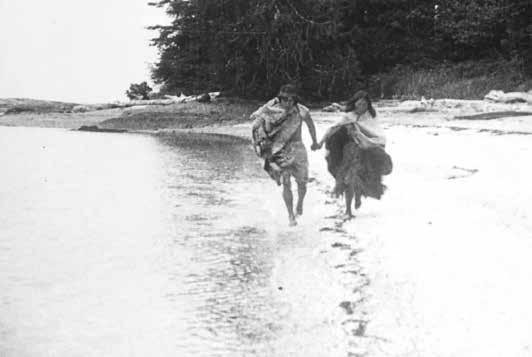 Introduction by Colin Browne
Introduction by Colin Browne
Print courtesy of Library and Archives Canada
Gifted Vancouver filmmaker Phillip Borsos (1953−1995) made good on the promise of his award-winning shorts (including Cooperage, Spartree, and the Oscar-nominated Nails) with his remarkable first feature, one of Canadian cinema’s most revered works. Richard Farnsworth is gentleman bandit Bill Miner, an aging Old West stagecoach robber released into the 20th century after decades in prison. His introduction to modernity includes his first exposure to the movies: Edwin Porter’s 1903 classic The Great Train Robbery, which inspires old-fashioned Miner to attempt some new-fangled larceny. Jackie Burroughs co-stars as feminist and photographer Kate Flynn. Shot by Frank Tidy and written by John Hunter, Borsos’s beautiful movie offers a charming evocation of place and an elegiac, film-smart take on the Old West and Old Westerns. It won seven Genies, including Best Film, Director, and Original Screenplay, and solidified B.C.’s reputation as a film centre in Canada.
Guest: Peter O’Brian
“One of the loveliest adventures of the year … I think [Richard Farnsworth] is incapable of a false or a dishonest moment.”
Roger Ebert, Chicago Sun-Times
9
January 11 (Wednesday) 6:30 pm January 11 (Wednesday) 8:45 pm
Cariboo Country: How to Break a Quarter Horse + The Education of Phyllistine
“These sophisticated early television films from CBUT (CBC’s Vancouver station) are pioneering works of producer-director Philip Keatley. The portrayal of the personages in these films reveal tremendous power and dignity, and they stay with you as unforgettable characters. A rare achievement, in any context.” Harry Killas
During his distinguished career with CBC Vancouver, North Vancouver-raised Philip Keatley created the groundbreaking Cariboo Country, the network’s first dramatic series filmed on location—it was set amongst the ranchers and First Nations people of B.C.’s Chilcotin region. He also helped develop and produce The Beachcombers, the longest-running dramatic series in English Canadian TV history. The Cariboo Country dramas, written by Paul St. Pierre, were pioneering for another reason: all First Nations characters were played by First Nations actors, including future Oscar-nominee Chief Dan George, a series regular as “Ol’ Antoine.” The two films in this program, both hour-long Cariboo Country specials, treat issues of racism, justice, friendship, and family. Both won Canadian Film Awards for TV Entertainment.
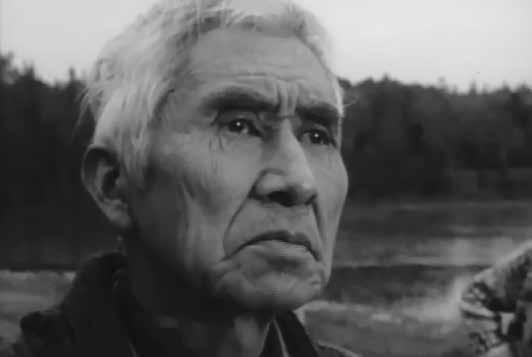
How to Break a Quarter Horse
Canada 1966 Philip Keatley 60 min.
The Education of Phyllistine
Canada 1963
Philip Keatley 60 min.
Introduction by Colin Browne
Guests: Sun Dance Chief Rueben George, Julia Keatley
Acknowledgements: The Cinematheque is grateful to the CBC and Nicole Durrant, CBC English Services, for making this complimentary program possible.
Please note: Unclaimed tickets for complimentary screenings at The Cinematheque will be released 15 minutes before showtime. Please arrive early to guarantee your seat.
10
February 1 (Wednesday) Free Admission 7:00 pm
stories and images have been presented and persist in our imaginaries of here? What others are not presented and consequently need to be? Browne’s rich, condensed, and ultimately moving work asks these questions and sets up our series: What do the films of British Columbia represent to us, and what are the cinematic narratives of here?”
“What
Madeleine Is …
Canada 1971 Sylvia Spring 89 min. 35mm
“Madeleine Is … captures the zeitgeist. Artist Madeleine’s journey through the counterculture era still resonates.”
Harry Killas
The first Canadian fiction feature directed by a woman, Sylvia Spring’s Madeleine Is … investigates themes of patriarchy, art, and emancipatory politics in the context of Vancouver’s counterculture. Madeleine (Nicola Lipman), an aspiring painter from Quebec, relocates to Vancouver at the height of the hippie era and has a series of encounters with men—a macho political radical, a fantasy figure-cum-young businessman, an older homeless man —which lead to self-discovery. The city and its paradoxes and politics are vividly evoked, while the era’s emergent feminism informs the film’s perspective. Spring and her film provided a model for indie cinema here.
Video introduction by Sylvia Spring
“Spring’s film achieves something fairly difficult: it takes people of five varying social types and never once treats them as stereotypes or without generosity … Spring’s vision is authentic and accepting … It’s worth opening yourself up to.”
Kay Armatage, Take One
“
I Heard the Owl Call My Name
USA/Canada 1973 Daryl Duke 90 min. Blu-ray
I Heard the Owl Call My Name was one of the more startling revelations of this series, and we are excited to be able to present it to our audiences once more. A moving lead performance by British New Wave actor Tom Courtney (Billy Liar, Doctor Zhivago) is grounded in the authenticity of place and people on the west coast of British Columbia.”
Harry Killas
A young Anglican priest is assigned to a remote Kwakwaka’wakw (formerly Kwakiutl) community in British Columbia in Vancouverborn producer-director Daryl Duke’s much-loved telefilm, adapted from the best-selling novel by American author Margaret Craven. English actor Tom Courtenay has the lead, Dean Jagger plays his bishop, and local First Nations performers Marianne Jones, Paul Stanley, and George Clutesi top the supporting cast. Craven’s book was based on her experiences visiting Kingcome (aka Gwa’yi), the story’s setting, and other Kwakwaka’wakw villages on B.C.’s coast. In 2003, Duke, a central figure in local filmmaking and broadcasting (he co-founded CKVU-TV, now Citytv Vancouver), became the first Western Canadian to win the Directors Guild of Canada’s Lifetime Achievement Award.
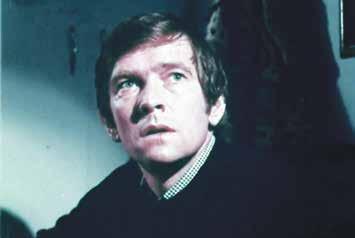
“[A] beautiful film translation of the Margaret Craven book.”
Leonard Maltin
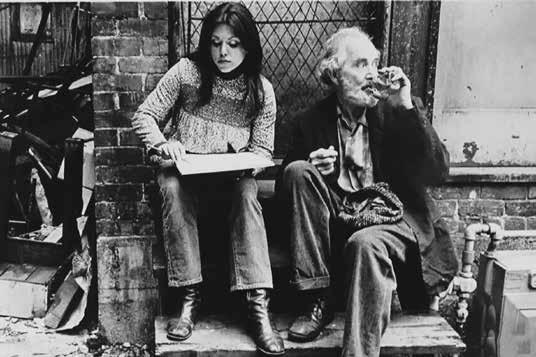
11
February 22 (Wednesday) 6:30 pm February 22 (Wednesday) 8:45 pm
Celluloid Dreamland: The Cinema of Guy Maddin January 26
– February 20
Cinephilic Vancouverites, heed our call! Guy Maddin, legendary Winnipeg auteur and the world’s foremost reanimator of cinema’s dead and buried past, is coming to The Cinematheque in the twilight days of January to celebrate the re-release of his warped first feature Tales from the Gimli Hospital, that midnight-movie nonpareil that made Maddin a Canadian cult hero. By way of a ticker-tape parade, we are mounting a major retrospective devoted to the Manitoban’s sublimely strange and defiantly singular oeuvre, for which the movie-mad genius is deservedly renowned. Maddin will join us for a conversation on opening night (January 26) following a screening of the newly restored (and “Redux”-ed) Gimli. He’ll then return the next evening to introduce the film he has programmed especially for this series—the suitably deranged Tod Browning 1936 curio The Devil-Doll (screening from a 35mm film print, naturally).
Maddin, a Winnipeg Film Group alumnus and self-professed cinematic “primitivist,” has achieved international prominence for his ability to speak fluently (and very selfconsciously) in the archaic vernacular of cinema’s antiquity. For nearly forty years, starting with his outré 1985 debut The Dead Father, Maddin has drawn from and deliriously deformed the hallmarks of silent and early-sound cinema—from Soviet constructivism to German Expressionism to Hollywood melodrama and much, much else—to forge celluloid fantasias teeming with pastiche, perversity, and hilariously surreal illogic. Intertitles, iris shots, gauzy lenses, colour tinting, awkward dubbing, stilted acting: all and more are in abounding supply in Maddin’s faux-old-fashioned art making, which he wields with a masterful mix of irony and genuine nostalgic affection. Indeed, as uproariously absurd as some of Maddin’s movies may be—heck, look no further than Isabella Rossellini outfitted with a pair of beer-filled glass legs in his Busby Berkeley hallucination The Saddest Music in the World —there is above all else a giddy, glorious acclamation in his work for a pre-code era of wonder and mischief, when the nascent artform toed no line and knew scant limits of excess.
“Celluloid Dreamland,” The Cinematheque’s most substantial Guy Maddin retrospective to date, presents all twelve feature-length films from our country’s (if not the world’s) most distinctive film stylist. As befits an artist who specializes in the excavation of the medium’s ghostly past, half of the
dozen films will be projected from archival 35mm prints. The series will also include a quartet of essential Maddin shorts, including the bona fide brilliant Heart of the World, as well as a two-day filmmaking workshop on bygone film aesthetics by our Learning & Outreach team.
From his earliest attention-grabbing excursions into film burlesque, to his cheekily self-mythologizing “Me Trilogy” mockmemoirs, to his latest febrile collaborations with fellow Winnipeg weirdos Evan and Galen Johnson, there is a maelstrom of Maddin to get euphorically lost in.

January 26 (Thursday) Opening Night 7:00 pm
January 27 (Friday) 8:30 pm
January 29 (Sunday) 6:30 pm
Tales from the Gimli Hospital Redux
Canada 1988
Guy Maddin 64 min. DCP
New Restoration
“It all happened in a Gimli we no longer know.” Remastered and slightly rejigged in this brand-new “Redux” edition, Guy Maddin’s delirious debut feature is back to reclaim its rightful place atop the summit of cult Canadiana! A no-budget, all-gusto paean to moviemaking of yore—namely, the eras of silents and parttalkies—Tales from the Gimli Hospital tells a mock-saga of lurid lust and obsessive envy set in the Icelandic fishing village of Gimli, Manitoba, during a turn-of-the-century smallpox epidemic. There, a pox-stricken hospital patient with a ghastly secret (Kyle McCulloch) seethes with jealousy over his cherubic roommate’s popularity among the nurses. Maddin’s hallucinatory work was famously turned down by TIFF—its parodic anachronisms mistaken for technical amateurism—before becoming a midnightmovie sensation south of the border. Strange and surreal, and suffused with sundry cinephilic pleasures, Maddin’s DIY debut heralded the arrival of the weirdest of rare birds in Canadian cinema.
“A funny, strange, and wondrous little film … Its rich and startling images have been rightly compared to everything from David Lynch’s Eraserhead to the films of Cocteau and Murnau.”
Stephen
Godfrey, Globe and Mail
preceded by The Heart of the World Canada 2000 Guy Maddin 6 min. DCP


New Restoration

Commissioned for the Toronto International Film Festival’s 25th anniversary in 2000, Guy Maddin’s silent melodrama mixes Metropolis, Murnau, and Eisenstein in a mad Kino rush. A mere six minutes in length, The Heart of the World is a breathtaking masterpiece that rivals the director’s finest feature-length work and deserves its status as one of the best Canadian films ever made.
“Celluloid Dreamland” Opening Night
The January 26 opening night program will include a postscreening conversation between Guy Maddin and The Cinematheque’s Artistic Director Shaun Inouye, followed by an audience Q&A.
13
“If you love movies in the very sinews of your imagination, you should experience the work of Guy Maddin.”
Roger Ebert
Infernal Affairs Trilogy
6 6:30 pm Infernal Affairs 8:40 pm The Departed 7
Infernal Affairs Trilogy
5 6:30 pm Infernal Affairs 8:40 pm Infernal Affairs II
New Restorations
13 6:30 pm Nothing But a Man 8:30 pm Vengeance Is Mine
14 6:30 pm O Sangue 8:30 pm No Fear, No Die New Restorations
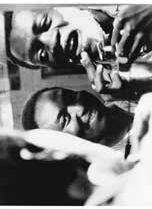
Michael Roemer
New Restoration
11 6:30 pm In the Land of the Head Hunters + The Song That Reached His Heart Guest 8:45 pm The Grey Fox Guest
The Image Before Us
10
6:00 pm Infernal Affairs II 8:30 pm Infernal Affairs III Infernal Affairs Trilogy
9 7:00 pm The Departed
Infernal Affairs Trilogy

8 3:30 pm Infernal Affairs 6:00 pm Infernal Affairs II 8:30 pm Infernal Affairs III
Essential Cinema
20 6:30 pm O Sangue 8:30 pm The Rules of the Game
Saturday
27 6:30 pm The Devil-Doll Guest 8:30 pm Tales from the Gimli Hospital + The Heart of the World
Guy Maddin
12 6:30 pm The Rules of the Game Infernal Affairs Trilogy 8:45 pm Infernal Affairs New Restoration
Friday
Michael Roemer
18 7:00 pm Woman on the Roof Guest
Frames of Mind
16 6:30 pm No Fear, No Die 8:30 pm O Sangue
New Restorations
15 6:00 pm The Rules of the Game Michael Roemer 8:10 pm Nothing But a Man
26 Opening Night 7:00 pm Tales from the Gimli Hospital + The Heart of the World Guest

Guy Maddin
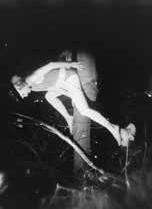
21 4:00 pm Bambi Michael Roemer 6:30 pm Nothing But a Man 8:30 pm The Plot Against Harry Film Club
19 6:30 pm Vengeance Is Mine New Restoration 9:00 pm No Fear, No Die Michael Roemer
23 6:30 pm The Plot Against Harry New Restoration 8:20 pm The Rules of the Game
22 11:00 am Bambi New Restoration 6:00 pm The Rules of the Game Michael Roemer 8:15 pm Vengeance Is Mine
Thursday
DIM Cinema
Wednesday
28 6:30 pm Archangel + The Dead Father 8:50 pm Careful 17 24 Monday
Guy Maddin Sunday
Tuesday
January February
Sunday Monday Tuesday Wednesday Thursday Friday Saturday
Infernal Affairs Trilogy
25 7:00 pm Jumana Manna: Wild Relatives
3 6:30 pm Cowards Bend the Knee + Sissy Boy Slap Party 8:10 pm The Saddest Music in the World
Guy Maddin
2 6:30 pm Twilight of the Ice Nymphs 8:30 pm Archangel + The Dead Father
1 7:00 pm The Education of Phyllistine + How to Break a Quarter Horse Free
Guy Maddin
Cinema
Guests Guy Maddin


30 6:30 pm Careful 8:40 pm Dracula: Pages from a Virgin’s Diary
Guy Maddin
18 3:30 pm The Forbidden Room 6:30 pm The Green Fog + Stump the Guesser Essential Cinema 8:20 pm Vertigo Guy Maddin
10 6:30 pm My Winnipeg 8:20 pm Brand Upon the Brain! Guy Maddin
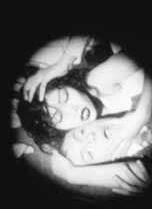
17 6:30 pm Keyhole Suwa Nobuhiro 8:30 pm H Story
Guy Maddin
16 6:30 pm My Winnipeg New Restoration 8:20 pm Millennium Mambo
15 7:00 pm I Snuck Off the Slave Ship Guest The Image Before Us
DIM Cinema
The Image Before 25
Chan Centre
8 7:00 pm Paper New
Mambo
Cinema 8:30
Frost
7:00
Is ... pm Pacifiction


The Cinematheque
Heard the Owl Call
Mambo
Images from top to bottom: Infernal Affairs , 2002; Nothing But a Man , 1964; No Fear, No Die , 1990; Tales from the Gimli Hospital , 1988; Careful , 1992; Cowards Bend the Knee , 2003; 2/Duo , 1997; Vertigo , 1958; Lemonade , 2016.
Tiger Guest Suwa Nobuhiro 9 6:30 pm 2/Duo 8:30 pm M/Other Suwa Nobuhiro 11 6:30 pm H Story 8:50 pm 2/Duo Suwa Nobuhiro 12 5:30 pm M/Other Guy Maddin 8:30 pm Brand Upon the Brain! Suwa Nobuhiro 13 6:30 pm 2/Duo Guy Maddin 8:30 pm My Winnipeg Film Club 19 11:00 am Wallace and Gromit × 3 New Restoration 6:00 pm Millennium Mambo Guy Maddin 8:30 pm Keyhole Essential Cinema 20 3:30 pm Vertigo Guy Maddin 6:30 pm The Green Fog + Stump the Guesser 8:20 pm The Forbidden Room
Us 22 6:30 pm Madeleine
8:45 pm I
My Name Cinema Thinks 27 the World 7:00 pm Lemonade Free Panel
23 Connects
Learning & Outreach pm Neptune
4 10:00 am Early Cinema Filmmaking Workshop (Day 1) Guy Maddin 6:30 pm Dracula: Pages from a Virgin’s Diary 8:20 pm Twilight of the Ice Nymphs 31 7 14 21 Guy Maddin New Restoration
29 6:30 pm Tales from the Gimli Hospital + The Heart of the World 8:10 pm Archangel + The Dead Father Learning & Outreach 24 6:00 pm Millennium
5 10:00 am Early Cinema Filmmaking Workshop (Day 2) Guy Maddin 6:00 pm The Saddest Music in the World 8:10 pm Cowards Bend the Knee + Sissy Boy Slap Party New
Guy Maddin pm Pacifiction New Restoration
6 6:30 pm Brand Upon the Brain! 8:30 pm The Saddest Music in the World 26 6:00 pm Millennium
Frames of Mind New Cinema 8:30 pm Pacifiction
7:00
January 27 (Friday)
6:30 pm
January 28 (Saturday)
6:30 pm
January 29 (Sunday) 8:10 pm
February 2 (Thursday) 8:30 pm
The Devil-Doll
USA 1936 Tod Browning 79 min. 35mm
Guy Maddin Selects
“
The Devil-Doll is so many things I don’t know where to begin. It’s a revenge tragedy and tearjerker, a genderfluid Parisian sci-fi fantasy love story, family melodrama and swamp movie, a special-effects mad scientist thriller, fugitive fable, film de policier, 1930s classic horror film, and a literary adaptation (The Count of Monte Cristo). It’s also the unholy spawn of Erich von Stroheim! To me, it is everything! Everything that has ever made me want to pick up a camera! Every second of The Devil-Doll is a mad pulpy dream! If only, upon my pillow, I could unspool dreams like this film every night!” (Guy Maddin).
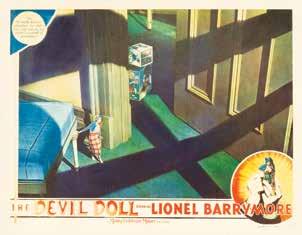
“Not since The Lost World, King Kong, and The Invisible Man have the camera wizards enjoyed such a field day … Grotesque, slightly horrible, and consistently interesting.”
Frank S. Nugent, New York Times
Archangel
Canada 1990 Guy Maddin 83 min. 35mm
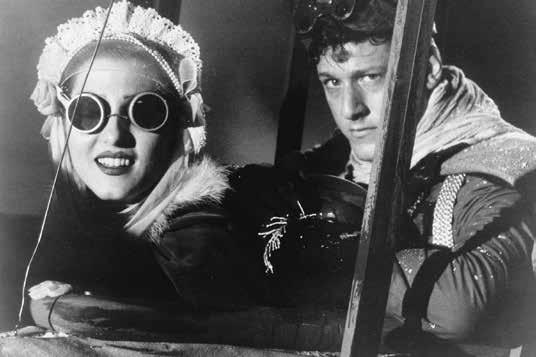
35mm Print
“Very delicate in its way—the wilted flowery dialogue and crazedsoap-operatics waft out like incense.”
J. Hoberman, Village Voice
Guy Maddin’s wild and warped Archangel sits between Tales from the Gimli Hospital and Careful in the Maddin filmography and showcases the faux early-cinema aesthetics and surrealist sensibility for which the Winnipeg arch genius is renowned. The film sets a delirium-dream tale of obsessive love in the remote Russian Arctic town of Archangel during the Great War. The war may actually be over, but no one’s remembered to tell one-legged Canadian soldier Boles (Kyle McCulloch), beautiful Veronkha (Kathy Marykuca), whom Boles confuses for his dead love Iris, or any of the film’s other amnesiac characters, all lost in murky, melodramatic memories of lovers lost or misremembered. “Maddin’s second feature is a masterpiece—a wistful, luminous conflation of absurdity, high romance, and heroic delusion. Buster Keaton would have approved. Buñuel too” (Take One’s Essential Guide to Canadian Film).
preceded by
The Dead Father
Canada 1985
Guy Maddin 25 min. DCP
The first film from Winnipeg weird-meister Guy Maddin is a demented tale of a deceased dad who keeps having temporary recoveries. “A deft mix of O. Henry and Rod Serling … echoing, in a more somberly surrealistic way, the out-of-orbit postmodernism of John Paizs” (TIFF).
16
Introduction by guest of honour Guy Maddin
Print courtesy of George Eastman Museum
January 28 (Saturday)
8:50 pm
January 30 (Monday) 6:30 pm
January 30 (Monday)
8:40 pm
February 4 (Saturday) 6:30 pm
Careful
Canada 1992
Guy Maddin 100 min. DCP
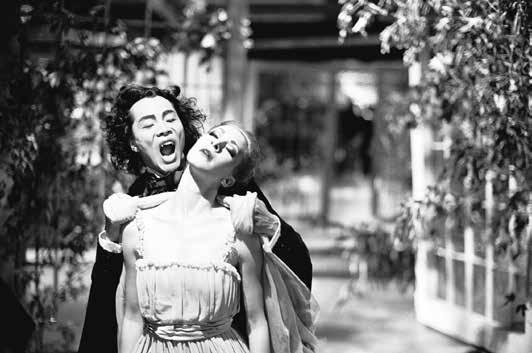
The recipient of rave reviews and audience ovations elsewhere, but rarely screened and little seen in its native land, Guy Maddin’s third feature—and first in (incredible) colour!—has been described as “nothing less than Twin Peaks directed by Erich von Stroheim” (USA Film Festival, Dallas). Careful is a bizarrely stylized period piece set in the mythical Alpine village of Tolzbad, a place so precariously set amongst the snowy peaks that even “the single bleat of a lamb” can precipitate a fatal avalanche. The villagers consequently all speak in careful whispers. The deliriously lurid plot concerns incestuous obsession, vengeful ghosts, a school for butlers run by a dominatrix, and sundry other fixations, fetishes, and repressed desires run amok. The ingenious art direction, tinted cinematography, and scratchy sound design suggest a lost early talkie from the late 1920s.
“[A] masterpiece … One of a kind, even within Maddin’s bewitching oeuvre.”
Michael Atkinson, Sight and Sound
Dracula: Pages From a Virgin’s Diary
Canada 2002 Guy Maddin 75 min. 35mm
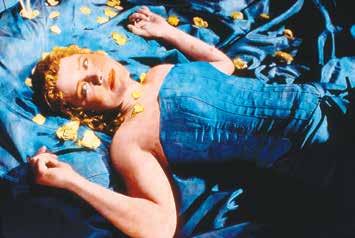
35mm Print
“A minor masterpiece of erotic surrealism.” Matthew Leyland, Sight and Sound
Beautifully transposing the Royal Winnipeg Ballet’s interpretation of Bram Stoker’s classic vampire tale from stage to screen, cult auteur Guy Maddin serves a sumptuous, erotically charged feast of dance, drama, and shadow. The black-and-white and blood-redpunctured Dracula: Pages From a Virgin’s Diary is a Gothic Grand Guignol of the notorious Count and his victims, fringed with the expressionistic strains of Gustav Mahler. Dracula was originally made for television, and went on to win both an International Emmy and Gemini Awards. Following its success at film festivals around the world, the piece was transferred to 35mm film and released theatrically to great acclaim. “A phantasmagoric movie … Maddin has discovered a new kind of cinema, the welding of silent-film technique, avant-garde imagery, and 21st century technology” (Bruce Diones, The New Yorker)
Print courtesy of TIFF Film Reference Library
17
February 2 (Thursday) 6:30 pm
February 4 (Saturday) 8:20 pm
Early Cinema 2-Day Filmmaking Workshop
February 4–5
Embrace the archaic and make a silent-era inspired film with The Cinematheque! Following the example of Guy Maddin, whose films evoke all the weirdest aspects of early cinema aesthetics, this two-day workshop will take participants through the full filmmaking process to create original silent shorts.
Saturday’s workshop will cover the key artistic features of early cinema and explore how filmmakers today can take inspiration from film’s first few decades. Participants will then form small groups and plan their projects before learning basic camera and lighting techniques. Day one includes a private screening of Maddin’s newly restored Tales from the Gimli Hospital. On Sunday, we will shoot and edit the projects. The Cinematheque will add any necessary finishing touches to the films before we share them on our public Vimeo channel.
All levels of experience are welcome!
Dates:
February 4 (Saturday) 10:00 am–4:00 pm February 5 (Sunday) 10:00 am–4:00 pm
Location: We will meet in the lobby of The Cinematheque on both days. The Saturday workshop and screening will take place in The Cinematheque theatre. Filming on Sunday will take place next door at the Cineworks studio.
Cost: $50 Ages: 19+
Twilight of the Ice Nymphs
Canada 1997 Guy Maddin 90 min. 35mm

35mm Print
“Mesmerizing … A mythic fantasy of unslaked desire, dangerous passion, and mounting paranoia … Suggests a B-movie version of Shakespeare’s Tempest isle.”
Michael Wilmington, Chicago Tribune
The fourth feature-length excursion into the bizarre, movieobsessive brainpan of Guy Maddin is the warped Winnipeger’s first film boasting seasoned international actors. Unfolding like some peyote-dream confluence of Douglas Sirk’s garish, gorgeous 1950s melodramas and Shakespeare’s The Tempest, Maddin’s second colour film is set in mystical Mandragora, an ethereal, twilit land of endless orange skies, teeming flora, and raging, darkness-deprived libidos. Political prisoner Peter (an uncredited Nigel Whitmey) is returning home to Mandragora after years of incarceration abroad, and falls in love with a mysterious woman (Pascale Bussières) en route. He arrives to find his ostrich-farming sister (Shelley Duvall) in the throes of infatuation for an evil onelegged mesmerist (R.H. Thomson), who has diabolical designs on Peter’s beloved. Maddin’s febrile imagination had never been in finer form. Twilight is as rapturous a delirium dreamscape as narrative cinema had yet conjured up!
Print courtesy of TIFF Film Reference Library
18
February 3 (Friday) 6:30 pm
February 5 (Sunday) 8:10 pm
February 3 (Friday) 8:10 pm
February 5 (Sunday) 6:00 pm
February 6 (Monday) 8:30 pm
Cowards Bend the Knee
Canada 2003 Guy Maddin 64 min. DCP
35mm Print
The first in Maddin’s self-mythologizing “Me Trilogy” (followed by Brand Upon the Brain! and My Winnipeg) was commissioned for Toronto’s Power Plant Contemporary Art Gallery and originally presented as an installation piece in ten peepholes. In it, actor Darcy Fehr portrays young, handsome Guy Maddin, star player of the Winnipeg Maroons ice-hockey team, boyfriend of the beautiful Veronica (Amy Stewart), and unrepentant coward when it comes to any form of relationship. His inability to face adult responsibilities leads him into a tangled plot involving vengeful women, mad doctors, hand transplants, strangulation, and living waxworks. “A lovingly self-loathing peek at myself, but only as I would have enough courage to look—through a cracked glass made foggy by hairspray” (Guy Maddin). With its pre-sound style, delirious yet sincere melodramatics, morbid sense of humour, and dynamic hockey action, this is pure Maddin magic. Winner of a special jury prize at the 2003 Rotterdam Film Festival.
“Hardcore Maddin … What’s truly extraordinary about this movie— which strikes me [after] two viewings as Maddin’s masterpiece—is that it not only plays like a dream but feels like one.”
J. Hoberman, Village Voice
preceded by
Sissy Boy Slap Party
Canada 2004
Guy Maddin 6 min. DCP

At once a tribute to Kenneth Anger and a Three Stooges sendup of ethnographic documentary, Maddin’s ludicrous six-minute short demonstrates what can go wrong when a group of sissy sailors are left to their own silly (and slappy) devices.

The Saddest Music in the World
Canada 2003
Guy Maddin 99 min. DCP
“A nonstop seduction of eye and ear … The cult movie to end all cult movies.” Mark Harris, Georgia Straight
A delirious mock-1930s musical melodrama set in the Sorrow Capital of the World (that would be Winnipeg), Guy Maddin’s film has the maverick Manitoba visionary firing on all cylinders—or beer-filled glass legs! At the height of a Depression winter, glamorous beer baroness and double amputee Lady Port-Huntley (Isabella Rossellini), seeking to boost sales of her brew, launches an international contest to find the saddest music in the world. As mournful performers stream in from around the globe, Chester (Mark McKinney), a failed Broadway impresario recently returned to Winnipeg, seizes the chance for one last grasp at showbiz success. The hysterically tangled plot involves amnesia, romantic rivalries, betrayals, and family secrets, but the real show stopper is the Busby-Berkeley-gone-berserk spectacle of it all, as Maddin lets fly with his patented fever-dream rush of phantasmagoric production design and fetishized old-fashioned film technique.
19
February 6 (Monday) 6:30 pm
February 10 (Friday) 8:20 pm
February 12 (Sunday) 8:30 pm
February 10 (Friday) 6:30 pm
February 13 (Monday) 8:30 pm February 16 (Thursday) 6:30 pm
Brand Upon the Brain!
USA/Canada 2006 Guy Maddin 97 min. 35mm 35mm Print
Manitoba maverick Maddin made this mock silent serial, a deranged work of psychosexual faux autobiography and the second installment of his “Me Trilogy,” in Seattle. A house painter named Guy Maddin returns after thirty years to the mysterious island of Black Notch, where he grew up, and where he has come to paint the lighthouse in which his parents once ran an orphanage. The visit conjures up feverish memories of Guy’s fantastically dysfunctional childhood. A labyrinthine tale unfolds involving the hero’s sexually budding teenaged sister; their tyrannical, telescope-spying mother, obsessed with her children’s chastity; their workaholic scientist father, who may be conducting devious experiments on the orphans in their care; and two celebrity teen detectives, who arrive on the island to investigate. Maddin’s famed gift for early-cinema aesthetics and over-thetop melodramatics is masterfully evident; the film mixes Freud, Feuillade, Expressionist horror, and personal apocrypha into one very warped “remembrance in 12 chapters.” The narration is by Isabella Rossellini.
Print courtesy of TIFF Film Reference Library
“Nuttily wonderful … Once again, Maddin has ransacked film history and his own delirious imagination to create a work like none other.” Manohla Dargis, New York Times

My Winnipeg
Canada 2007
Guy Maddin 80 min. 35mm

35mm Print
“[An] endlessly inventive, deliciously eccentric, and surprisingly accessible fantasy-documentary.”
Kate Stables , Sight and Sound Geriatric hockey. Frozen horse heads jutting surreally out of the iced-over Red River. A scary Ann Savage, femme fatale of the 1945 noir classic Detour, as the director’s hairdresser mother. Guy Maddin’s wondrous My Winnipeg, a free-wheeling, fantastical mock-memoir that couldn’t possibly be mistaken for anyone else’s Winnipeg, is a sheer demented pleasure—another triumph from the movie obsessive and mad genius who is one of Canada’s (and the world’s) most distinctive directors. The film closed the book on Maddin’s “Me Trilogy” and was named Best Canadian Feature at TIFF 2007. “A hilarious ‘docu-fantasia’ … At once an autobiographical fever dream, a mythopoeic history of Canada’s coldest city, and a wacky exercise in ethnography … Holding together its hallucinatory blend is the director’s inspired, entertaining narration” (James Adams, Globe and Mail ). “If you’ve not yet experienced the pleasures of a Maddin film, this is an excellent place to start” (VIFF).
Print courtesy of TIFF Film Reference Library
20
February 17 (Friday) 6:30 pm
February 19 (Sunday) 8:30 pm
February 18 (Saturday)
3:30 pm
February 20 (Monday) 8:20 pm
Keyhole
Canada 2011
Guy Maddin 94 min. 35mm

35mm Print
This decidedly unhinged work by idiosyncratic auteur Guy Maddin is a ghost story/gangster flick/Homeric quest in the singular, movie-mad Maddin mode. Jason Patric plays mobster Ulysses Pick, returning home after a long absence with both a corpse and a living captive in tow—and the police in hot pursuit. A tense stand-off ensues between Ulysses’s fractious gang of hoodlums inside and the coppers outside, while our hero wanders his spooky, ramshackle house in search of estranged wife Hyacinth (played by Isabella Rossellini). The peculiar proceedings are narrated by the naked elderly man (Louis Negin) chained to a bed upstairs! “Maddin’s mad mélange of melodramatic ghosts and meddlesome mobsters frames a memory tour like none other, exploding two genres with one powerful pop … Keyhole is a homecoming of a kind only Guy Maddin can pull off … Make no mistake, this is one of his great ones” (Peter Howell, Toronto Star).
Print courtesy of TIFF Film Reference Library

“Stunning to look at … [Maddin’s] act of collage attains a kind of lucid lunacy, and the references in combination become something new: handmade, logic-defying, and magical.”
Karina Longworth, Village Voice
The Forbidden Room
Canada 2015
Guy Maddin, Evan Johnson 119 min. DCP
“Like being sloppily slapped by a wet salmon to the point of submission … [An] inventive, audacious, and outright hilarious tour de force whatzit.” Mark Peranson, Cinema Scope
“Winnipeg original Guy Maddin and co-director Evan Johnson plunge us into celluloid delirium with this mad, multi-narrative maze of phantasmal fables. Maddin has always been driven by a deepseated love of strange and obscure sub-genres from cinema’s past. This intoxicating tour of weird set pieces—from a trapped submarine crew forced to eat flapjacks to an Expressionist music video featuring a man (Udo Kier) fatally obsessed with women’s backsides—is a paean to movies lost, forgotten, or never made. There’s also an art-film lover’s dream cast: cinema icons, European stars, Quebec’s best actors, and indefatigable Maddin regular Louis Negin. With each new ‘room’ as depraved, sinful, beautiful, wild, and wondrous as the last, it’s as if The Forbidden Room was designed to give prudish censors a never-ending string of coronaries” (Steve Gravestock, TIFF).
Best Canadian Film Toronto Film Critics Association (2015)
21
February 18 (Saturday)
8:20 pm
February 20 (Monday) 3:30 pm
February 18 (Saturday)
6:30 pm
February 20 (Monday) 6:30 pm
Vertigo
USA 1958
Alfred Hitchcock 128 min. DCP
Met with middling reviews and indifferent audiences upon original release, Hitchcock’s dreamlike chef d’oeuvre, the basis for Guy Maddin’s hallucinatory found-footage homage The Green Fog, is now regarded as one of cinema’s grand masterpieces—and, until very recently, was considered “the best film of all time” according to prominent film journal Sight and Sound ’s decennial poll of international critics. (It was dethroned by Chantal Akerman’s Jeanne Dielman … in the just unveiled 2022 poll.) Scottie (James Stewart), a former San Francisco policeman suffering from vertigo, is sucked into a vortex of romantic obsession after he is hired to tail blonde, coolly beautiful Madeleine (Kim Novak), the wife of an old pal. Many unhappy months later, Scottie meets a Madeleine look-alike, and obsessively attempts to make her over in Madeleine’s image. The director’s own dark obsessions with his cool-blonde leading ladies are well documented. This perverse, poetic, moodily muted psychological thriller, with its stunningly cynical view of male-female relations, is Hitchcock’s most nakedly honest film.

“Hitchcock’s masterpiece … and one of the four or five most profound and beautiful films the cinema has yet given us.”
Robin Wood
The Green Fog
USA 2017
Guy Maddin, Evan Johnson, Galen Johnson 62 min. DCP
“Not so much an assemblage as it is a conjuring … You don’t just watch these clips—you see through and between them. The juxtapositions create vital, cosmic connections.”
Bilge Ebiri, Village Voice
The first sign that Guy Maddin is taking this video collage, a seriously askew tribute to Vertigo commissioned by the San Francisco Film Society, to the cosmos, is that we never see Madeleine or Scottie or Midge, but a hundred faces—some anonymous, some stars—none of them, except maybe Chuck Norris, delivering a consistent performance. Yet, as Maddin’s free replay of that San Franciscan masterpiece shows, you might still see Vertigo in their eyes. A supercut of Hawks, Obayashi, Welles, Verhoeven, Murder, She Wrote, and many more, The Green Fog proves Maddin, co-directing with Johnsons Evan and Galen, as perhaps the greatest re-interpreter of Hitchcock’s oneiric tale of obsession next to Chris Marker. Filling the screen with context clues (the Golden Gate, Mission Cemetery, Taylor Street) but scrambling our sensorial footholds (cutting out sound, adding layers of surveilling eyes, tinting footage), Maddin reveals that a little disorientation can activate just as much of our mental powers of creation as the more frenzied entries in his filmography.
preceded by
Stump the Guesser
Canada 2021 Guy Maddin, Evan Johnson, Galen Johnson 19 min. DCP
In this digital return to the carnivalesque contests of The Heart of the World, a mentalist is plagued by three characteristic curses: bureaucratic list-ticking, tragic descent à la Murnau’s The Last Laugh, and Oedipal fate.

22
“A nightmare that moves slowly and confidently … I was captivated by the film and its stealthy evocation of pure evil.”
Peter Bradshaw, The Guardian

February 24 (Friday)
8:30 pm
February 25 (Saturday) 7:00 pm
February 26 (Sunday) 8:30 pm
The Cinematheque is more than a movie theatre! We are a nonprofit organization and registered charity dedicated to advancing the understanding and appreciation of cinema as art by bringing the very best in film culture and education to Vancouver audiences of all ages.
As a charitable institution, The Cinematheque relies on the support of its donors. We invite you to contribute to The Cinematheque and support the innovative year-round programming and award-winning education programs of western Canada’s largest film institute.
Pacifiction
France/Spain/Germany/Portugal 2022
Albert Serra 165 min. DCP
Catalan filmmaker Albert Serra, whose hyper-singular cinema is highly regarded if occasionally allergic to being actually enjoyed (see Liberté), has crafted his most ambitious and, dare we say, accessible work to date with Pacifiction, among the best films of 2022. Anchored by an extraordinary performance from Benoît Magimel, Serra’s spellbinding epic chronicles the efforts of a cunning High Commissioner to mitigate Indigenous unrest on a French Polynesian island. What starts out as an elliptical portrait of colonial exploitation (an “exotic” tourist nightclub is a recurring set piece) slowly, strangely morphs into a hallucinatory conspiracy thriller, as the arrival of French Marines sparks rumour that nuclear testing is afoot. “Serra’s gripping, atmospheric thriller is a slowbuilding fever dream that lulls before catching us by surprise with the depths of its darkness, a film that allows its incisive social commentary about the remnants of colonialism to surface through quiet observation and aesthetic audacity” (NYFF 2022). In French with English subtitles
The best film of 2022 Cahiers du cinéma
Ways to Give
Become a Monthly Donor
A convenient, secure, and affordable way to support The Cinematheque year-round! Your donation will be automatically charged to your credit card each month, and you can stop anytime. A charitable tax receipt will be given for all donations over $50.
Make an Annual Gift
As a donor, you will receive numerous benefits, including having the bi-monthly Program Guide mailed to your home and discounts at our concession. You will also receive a tax receipt for your contribution.
Dedicate a Seat
With a $250 donation, you may dedicate a seat at The Cinematheque to show your support for the essential cinema experience, celebrate a special occasion, or honour a loved one. A custom engraved plaque will be secured to the Cinematheque seat of your choosing for a period of five years. You will receive a charitable tax receipt for the full amount of your donation.
For more information: thecinematheque.ca/about/donate
23 New
Cinema
DONATE
Suwa Nobuhiro × 3
February 9–17
Relatively unknown in North America, Japanese writerdirector Suwa Nobuhiro (b. 1960) has amassed an international following for a distinctive brand of rigorous, vérité relationship dramas that share more in common with European art cinema than the works of his Japanese contemporaries (Kore-eda, Kurosawa, Hamaguchi et al.). Little wonder why the French have virtually adopted the filmmaker as one of their own, producing the lion’s share of his output this century.
Born and raised in Hiroshima, Suwa studied filmmaking at the Tokyo Zokei University. He parlayed a love of French cinema into his no-budget 1986 debut Hanasareru Gang, an explicit homage to the nouvelle vague. He then worked as an assistant director for, among others, punk auteur Ishii Gakuryu (formerly Ishii Sogo), before making a series of documentaries for Japanese television. Suwa returned to feature directing with the astonishing 2/Duo (1997), a granular portrait of a couple in crisis (a Suwa specialty) starring a fresh-faced Nishijima Hidetoshi (Drive My Car). Here, as in M/Other (1999), his follow-up and international breakthrough, Suwa establishes the twin hallmarks of his singular cinema: improvised performances developed in close collaboration with his actors (à la Mike Leigh or Jacques Rivette), and a sophisticated docu-fictional approach marked by austere, unbroken long takes. Comparisons to the films of Cassavetes and Pialat are unsurprising, but fail to do justice to what Suwa uniquely achieves.
Following H Story (2001), his hall-of-mirrors homage to Alain Resnais’s Hiroshima mon amour, Suwa relocated to France to continue his career. “I do have the feeling that France is one of the places from which my films originate,” the director has stated. “But the main reason is that it is extremely difficult to continue making auteur films in Japan.” He recently returned to Japan to shoot Voices in the Wind (2020).
Despite an acclaimed body of work that includes prize winners at Cannes and Locarno (and a Special Mention at VIFF), Suwa’s films have scarcely screened outside of festivals, and have never before received theatrical distribution in North America. The Cinematheque is proud to present a rare three-film primer on his incisive (and woefully underseen) cinema, featuring a sampling of his seminal early works made in Japan.
February 9 (Thursday)
6:30 pm
February 11 (Saturday) 8:50 pm February 13 (Monday) 6:30 pm
2/Duo 2/デュオ Japan 1997 Suwa Nobuhiro 90 min. DCP

New Restoration
Earning comparison to the searing domestic dramas of John Cassavetes, Japanese writer-director Suwa Nobuhiro’s remarkable sophomore feature is an unblinking portrait of a couple’s slowly imploding relationship. Nishijima Hidetoshi (Drive My Car), in one of his earliest roles, plays an out-of-work actor living in a shoebox apartment with his girlfriend (Eri Yu), a salesclerk supporting them both. Their relationship turns toxic when he unexpectedly proposes marriage, triggering a chain reaction of erratic behaviour and emotional abuse. Suwa and cinematographer Tamura Masaki (Tampopo) capture the mercurial proceedings with a deft combination of fixed and handheld camerawork. The film’s boldest conceit has the couple periodically answering questions posed by an off-camera interviewer (presumably Suwa himself). These interruptions reframe the movie as (faux) documentary, adding a fascinating wrinkle to a work developed through improvisation and without script. Newly restored for its 25th anniversary, 2/Duo returns to Vancouver for its first engagement since VIFF 1997.
Dragons & Tigers Award, Special Mention Vancouver International Film Festival 1997
“A must see … [A] fascinating and neglected film.”
Jonathan Rosenbaum, Chicago Reader
24
Acknowledgements: “Suwa Nobuhiro × 3” is generously supported by The Japan Foundation, Toronto.
February 9 (Thursday)
8:30 pm
February 12 (Sunday) 5:30 pm
February 11 (Saturday)
6:30 pm
February 17 (Friday) 8:30 pm
M/Other
Japan 1999
Suwa Nobuhiro 147 min. DCP
One of the ten best films of 2000 (#6)

Cahiers du cinéma
Widely considered to be Suwa’s crowning achievement, the international breakthrough of the Japanese auteur won the FIPRESCI prize at Cannes and festival acclaim worldwide. Rendered with patience, sensitivity, and remarkable precision of form, M/Other observes the ripple effects in a Tokyo couple’s relationship when a divorced father’s eight-year-old son comes to live with him and his new girlfriend. As traditional gender roles creep into the home—including an onus on women to provide childcare—a hasty marriage proposal sets the relationship spiraling. (Popping the question also serves as catalyst for crisis in 2/Duo, the director’s superb preceding feature.) Suwa, shooting without script in scrupulous long takes, elicits astonishingly naturalistic, improvised performances from leads Miura Tomokazu and Watanabe Makiko, both credited as co-writers. The film’s discordant score, penetrating insights into domestic dynamics, and striking formal assuredness bespeak a director operating at the apex of his considerable powers.
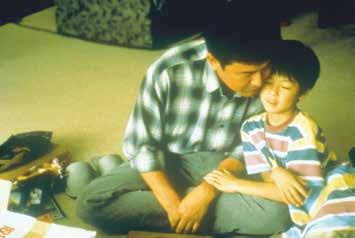
H Story
Japan 2001 Suwa Nobuhiro 112 min. 35mm
Imported 35mm Print
Alain Resnais’s immortal Hiroshima mon amour, which figured prominently in our recent “Renais 100” program, is at the centre of Suwa’s beguiling mise en abyme movie. Suwa plays a version of himself, assembling a cast and crew in Hiroshima to remake Resnais’s film on its 40th anniversary. For Emmanuelle Riva’s iconic role, the director hires French actress Béatrice Dalle (also doubling as herself), who objects to staging a faithful remake and fails to remember Marguerite Duras’s original dialogue. Suwa, who speaks no French, struggles to salvage his disastrous production. A postmodern rumination on a modernist masterpiece, H Story, like the film within it, actively frustrates and undermines any resemblances to its source material. Rather, Suwa uses the hallof-mirrors premise to draw connections between filmmaking, film history, and his own biographical ties to Hiroshima, his birthplace. Dalle also starred in Claire Denis’s controversial Trouble Every Day, released the same year. Suwa’s ensuing films would almost exclusively be made in France.
“Courageous … H Story is perhaps not a celebration of cinema’s autumn, but of its imperceptible spring.”
Olivier Joyard, Cahiers du cinéma
25
“The sublimely understated work of Suwa Nobuhiro comprises a rich, but mostly unexposed, pocket of contemporary Japanese cinema.”
Beatrice Loayza, MUBI Notebook
Chan Centre Connects Cinema Thinks the World
Chan Centre Connects film screenings at The Cinematheque are curated to accompany performances in the Chan Centre Presents and Chan Centre EXP series, showcasing bold, global musicians who are actively reshaping the future of their art. For more information on these Chan Centre events and other Chan Centre Connects programming, please visit chancentre.com
February 23 (Thursday)
This free screening is presented as part of “Cinema Thinks the World,” a partnership project between the University of British Columbia and The Cinematheque. After the film, there will be a short reception followed by a one-hour panel talk with audience discussion.
7:00 pm February 27 (Monday) Free Admission 7:00 pm
Neptune Frost
Rwanda/USA 2021 Saul Williams, Anisia Uzeyman 105 min. DCP
“A bold, bizarre, and unflinchingly confident debut … Mesmerizing … A film and universe worthy of its place alongside the likes of Sun Ra’s Space Is the Place.” Toussaint Egan, Polygon
Wowing audiences at The Cinematheque last summer, Saul Williams and Anisia Uzeyman’s formally daring, sonically dazzling Afrofuturist musical returns for an encore occasioned by the Chan Centre EXP concert “Black Futures,” featuring Williams. Set in a sci-fi Burundi that portals into strange, interdimensional realms, Neptune Frost tells of two cosmically connected runaways—an intersex hacker and a coltan miner—who, together with an enclave of computer-foraging cyberpunks, seed a techno-revolution to topple industry and oppression. The anti-capitalist, anti-colonial, bracingly queer work is the latest installment of American hiphop poet Williams’s “MartyrLoserKing” multimedia project. The film’s pulsating songs are drawn largely from his 2016 album. The ravishing cinematography, bathed in glow-stick neon hues, is by William’s co-director (and wife) Uzeyman. Indigenous electronic collective The Halluci Nation (fka A Tribe Called Red) has a production credit, as does Lin-Manuel Miranda. In Kinyarwanda, Kirundi, Swahili, French, and English with English subtitles.
Curated in conjunction with “Black Futures: Saul Williams / Moor Mother / Irreversible Entanglements” at the Chan Centre on February 25 at 7:00 pm.

Lemonade
USA 2016
Beyoncé Knowles-Carter, Kahlil Joseph et al. 65 min. DCP
Beyoncé’s Lemonade was not only the best-selling album worldwide of 2016, but also one of the year’s best films. The 65-minute visual album, directed by Bey along with a cohort of collaborators including music video juggernauts Mark Romanek, Jonas Åkerlund, and Melina Matsoukas, anchors its political reflections on Black femininity in America in Beyoncé’s personal pain over her husband’s infidelity. Beyoncé’s ability to bend the boundaries of musical genres—her sound ranges from blues to country to trap, with samples from Andy Williams, Tchaikovsky, and Led Zeppelin—is matched by the film’s overwhelming number of visual references. Most famously, the lush settings and period costumes invoke Julie Dash’s Daughters of the Dust (the first feature directed by an AfricanAmerican woman distributed theatrically in the United States), but Lemonade also draws inspiration from Afrofuturism, African-American folklore, and Black female literary traditions. This textual richness is grounded in a cohesive narrative of trauma and redemption told in 11 chapters, linked by Beyoncé’s breathy readings of verses from British-Somali poet Warsan Shire’s works. This is serious art, but Lemonade is also unapologetically joyful, rebellious, and fun. All hail Queen Bey.

Panelists: Kimberly Bain, Vanessa Fajemisin, Louis Maraj, Alexis McGee
Please note:
26 Ongoing Series
Unclaimed tickets for complimentary screenings at The Cinematheque will be released 15 minutes before showtime. Please arrive early to guarantee your seat.
Ongoing Series
DIM Cinema
Moving-image art in dialogue with cinema.

DIM Cinema is a monthly series that presents Canadian and international moving-image art in dialogue with cinema. The series was initiated in 2008 by local curator Amy Kazymerchyk to draw attention to artists and experimental filmmakers whose practices engage with cinema as a medium, social context, formal structure, or architectural space. The name of the series is inspired by the diffused Vancouver sky, the darkness of the cinema, and a quote from James Broughton’s Making Light of It (1992): “Movie images are dim reflections of the beauty and ferocity in mankind.” DIM Cinema has been curated by Michèle Smith since 2014.
January 25 (Wednesday) 7:00 pm February 15 (Wednesday) 7:00 pm
Jumana Manna: Wild Relatives

Total running time: 97 min.
Graced with beauty, humanity, irony, and touches of humour, Jumana Manna’s sophomore feature witnesses the afterlife of a unique event that captured headlines worldwide: the first complete withdrawal of a nation’s seed collection from the “doomsday vault” (officially known as the Global Seed Vault), which is burrowed deep beneath the Arctic permafrost as an agricultural safeguard should disaster strike. The film traces the journey taken by the Syrian backup seeds: from their origin in a seed bank in Aleppo, refuge in Norway, and germination and cultivation in Lebanon; to the accession of a new generation of backups into the vault. Encased within these endangered but resilient seeds are political, cultural, and personal narratives of displacement, revolution, war, climate change, biodiversity, monoculture, and extraction. Preceded by two short experimental documentaries. In English, Arabic, and Norwegian with English subtitles.
A Sketch of Manners
(Alfred Roch’s Last Masquerade)
Palestine/Norway 2013 Jumana Manna 12 min. DCP
The Goodness Regime
Palestine/Norway 2013
Jumana Manna, Sille Storihle 21 min. DCP
Wild Relatives
Germany/Lebanon/ Norway 2018
Jumana Manna 64 min. DCP
I Snuck Off the Slave Ship
Total running time: 69 min.
The program’s title is artist and musician Lonnie Holley’s metaphor for Black transcendence of “America.” Conformed to all 18 minutes of the eponymous track on his album MITH, the work captures Holley doing “his best to transgress reality with his imagination,” using handmade technology to liberate himself and the people he encounters. Alice Coltrane’s piano solo is the siren song guiding Cauleen Smith across America to sites of visionary experience that have inspired her. Humming along to the spiritual sung by Mahalia Jackson at the end of Douglas Sirk’s Imitation of Life, Deanna Bowen sinks layers of appropriated audio, video, and graphics into the the sonic matrix of her semi-autobiographical short on intergenerational trauma. Bert Williams’s Lime Kiln Club Field Day, the earliest surviving all-Black feature, is the inspiration for Garrett Bradley’s America, a series of vignettes scored by Trevor Mathison that reimagine the history of Black cinema as a “continuous thread of achievement.”
Imitation of Life
(A Hypothesis)
Canada 2008 Deanna Bowen 8 min. DCP
Pilgrim
USA 2016 Cauleen Smith 11 min. DCP
I Snuck Off The Slave Ship
USA 2019
Lonnie Holley, Cyrus Moussava 20 min. DCP
America
USA 2019
Garrett Bradley 30 min. DCP
27
Introduction by musician Khari Wendell McClelland
Curated by Michèle Smith
Frames of Mind
A mental health film series.
The Cinematheque is pleased to join with the Institute of Mental Health, UBC Department of Psychiatry, in presenting Frames of Mind, a monthly event utilizing film to promote professional and community education on issues pertaining to mental health and illness. Screenings are accompanied by presentations and audience discussions.
Series directed by Dr. Harry Karlinsky, Clinical Professor, Department of Psychiatry, University of British Columbia
Programmed by Caroline Coutts, film curator, filmmaker, and programmer of Frames of Mind since its inception in September 2002
February 8 (Wednesday) 7:00 pm January 18 (Wednesday) 7:00 pm
Woman on the Roof (Kobieta na dachu)

Poland/France/Sweden 2022 Anna Jadowska 97 min. DCP
Vancouver Premiere
A tour de force performance from celebrated Polish actress Dorota Pomykała as Mira anchors this heartbreaking film that asks (and answers) the question, “What would compel an unassuming 60-ish wife and mother to rob a bank in broad daylight with a small kitchen knife?” Most of the film takes place in the aftermath of this unsurprisingly unsuccessful crime, as writer-director Anna Jadowska peels back the layers of Mira’s uneventful life to reveal a desolate woman who, having spent her whole life caring for others with little recognition and no gratitude, now finds herself adrift, invisible, and overlooked by both family and society. Following the robbery, Mira slides further into depression and attempts suicide. She is hospitalized and receives mostly indifferent mental health care. Her situation arouses the neighbours’ scorn, her husband’s shame and anger, and her adult son’s disinterest, but no one comes close to providing the authentic compassion and love she craves. In Polish with English subtitles.
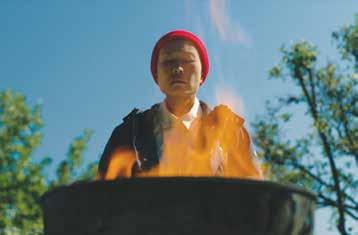
Post-screening discussion with TBC
Moderated by Dr. Harry Karlinsky
Paper Tiger
USA 2020
Paul Kowalski 94 min. DCP
Vancouver Premiere
Lily (Lydia Look) is a recently widowed Chinese immigrant overwhelmed with running the family business on her own and struggling with her new role as a single mother. Her 18-year-old son Edward (Alan Trong) is being relentlessly bullied at school and isn’t fitting in anywhere. His grades plummet and he starts spending all his spare time alone in his room playing violent video games. When Edward starts having hallucinations of his dead father and is diagnosed with a mental illness, Lily views it as a shameful secret to be hidden from everyone. And when he confides in his Aunt Mei, she tells him to trust in traditional Chinese medicine and throw away his pills. Without telling his mom, Edward stops taking his medication and begins to believe that one of the characters in his video game has come to life and is encouraging him to shoot up the school, taking vengeance on all those who wronged him. Inspired by a devastating true story.
Post-screening discussion with Dr. Paige Zhang, an emergency and consultation-liaison psychiatrist at Vancouver General Hospital.
28 Ongoing Series
Moderated by Dr. Harry Karlinsky
Cosponsored by the Community Mental Wellness Association of Canada.
Film Club
A movie matinée series for kids and their families.
Free popcorn and Film Club badge for junior cinephiles (ages 13 and under). Discounted ticket price ($6) too!
January 22 (Sunday)
11:00 am
Film Club is sponsored by
vancouvermom.ca makevancouver.com

February 19 (Sunday) 11:00 am
Bambi
USA 1942 David Hand 70 min. DCP
For a new year of Film Club, we’re taking a new look at a classic. Austro-Hungarian novelist Felix Salten’s Bambi, a Life in the Forest, which marks its centenary this year, was the basis for supervising director David Hand’s follow-up to the triumph of Snow White To modern eyes, the friendly trio of Bambi, “The Prince of the Forest,” Thumper, his extroverted rabbit sidekick, and Flower, a shy and sweet skunk, might look like cartoon formula. But this was the first time Walt and co. put magic aside: when Bambi gazes, like Narcissus, into the mirror of a forest puddle, a new world of animal sympathy was born. Painter Tyrus Wong, whose pastoral landscapes applied Song Dynasty techniques, is largely responsible for the film’s artistic leaps; his near-surreal mix of watercolour haze and bold, expressionist light answered the paradox of how to describe an imagined land not yet consumed by human influence.
Bambi will be preceded by The Green Man, a short film created during a five-day filmmaking workshop facilitated by The Cinematheque’s Learning & Outreach team. Grade 10 students Sonja, Norah, Kai, and Owen produced The Green Man as part of a Trek Outdoor Education program focused on environmentalism and social justice.
Additional Bambi screening!
January 21 (Saturday) 4:00 pm
Regular ticket prices are in effect for the January 21 screening of Bambi —but Film Club members (ages 13 and under) can still get a free kid-sized popcorn by showing their “Film Club” badge!

Wallace and Gromit × 3

Total running time: 82 min.
In their first three half-hour shorts, two of which won Academy Awards, stopmotion superstars Wallace and Gromit are unstoppably creative. Wallace, a stubborn and charming homebody voiced by the Yorkshire-accented Peter Sallis, is also a daydreamer who invents before he needs a tool, escape hatch, or breakfast. (In the world of animation, he is the foremost knowledge-keeper of gourmet cheese varieties.) And Gromit, Wallace’s aloof and trusty dog, is the superego to his ego, seemingly descended from both Snoopy and Oliver Hardy. Nick Park, having learned to animate as a child using a single frame advance camera and scraps of felt from his dressmaker mother, transformed Aardman Animations from an advertisement house to a place where Georges Méliès ( A Grand Day Out), Jules Dassin (The Wrong Trousers), and the early British films of Alfred Hitchcock ( A Close Shave) provided the referential basis for some of the most joyous entertainments ever made out of plasticine.
“Wallace and Gromit × 3” will be preceded by a selection of short stop-motion animations created by 8- to 12-year-old filmmakers in our Learning & Outreach programs. These shorts include Bunnies Picnic by Kayla and Ella, Pond Party by Miro, and The Bad Kid by Avelyn and Claire.
A Grand Day Out
United Kingdom 1989
Nick Park 23 min. DCP
The Wrong Trousers
United Kingdom 1993
Nick Park 29 min. DCP
A Close Shave
United Kingdom 1995
Nick Park 30 min. DCP
29 Ongoing
Series
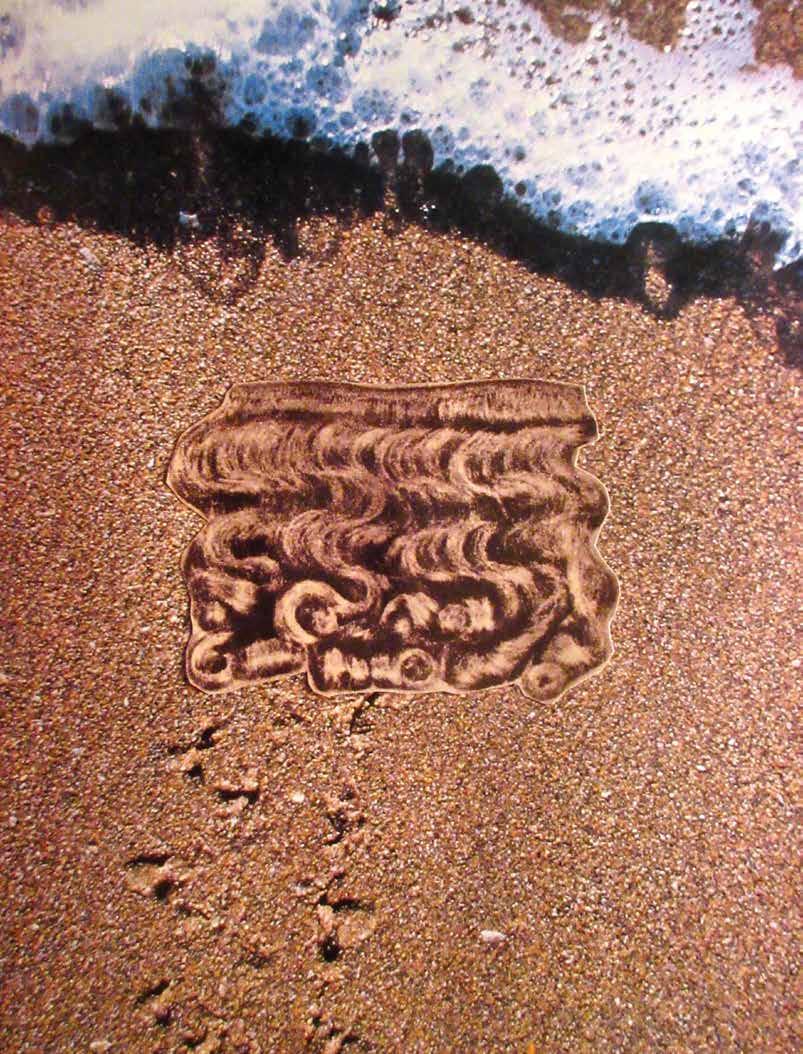
1131
Howe Street, Vancouver thecinematheque.ca












 Amy Taubin, Artforum
Amy Taubin, Artforum




 Introduction by Colin Browne
Introduction by Colin Browne










































